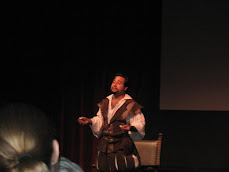| To be honest, farce, with its silly pratfalls, madcap humor, and preening
puns, has never been my play of choice. But, despite my misgivings, I found myself chuckling through much of "The Underpants," Steve Martin's witty adaptation of Carl Sternheim's 1911
German comedy, "Die Hose." It's at The Cleveland Play House through March
28. "The Underpants," about a pair of lady's bloomers that accidentally fall
down in public, is a bawdy sex farce with bite. For Jewish audience
members, that bite is particularly menacing. What keeps the silliness from being completely insubstantial, especially for the Jewish viewer, is a painfully sardonic sense of history. What is
merely hinted at in the turn-of-the-20th-century piece, becomes, in hindsight, a chilling reminder of a horrifically tragic fact.
Director Peter Hackett's frolicsome production emphasizes the humor, but
with an ominous undercurrent that is unmistakably clear.Presented without an intermission, the play loses comic steam and runs 15 minutes longer than its projected 90-minute length. Theo Maske is a boorish, middle-class civil servant concerned with appearances. When his comely wife's undies fall to her ankles during the king's parade, he is mortified by the prospect of scandal. Those witnessing the event, including an aspiring poet and a hypochondriac
barber, are smitten, and both are eager to take up lodgings in the room for
rent at the Maske household.
The absurdist plot becomes the vehicle for a satire on bourgeois morality
and topics ranging from sexual hypocrisy (married men can have affairs, but
not their wives) to antisemitism. Carl Sternheim, a prolific writer and playwright, was the son of a wealthy Jewish banker and a Protestant mother. According to sources, throughout his
life, Sternheim struggled with his confused religious identity. Sternheim used "The Underpants" to tweak the monolithic and unimaginative society that would eventually promote the rise of Hitler; his works were banned by the Nazis. Between the laugh lines, the references to Germany's political future are unmistakable. Theo himself is the perfect German bureaucrat who doesn't rock the boat or question the system. "I do my duty. I blend in," says the
stolid clerk, who eats, sleeps and works and does what he is told.
Bill Clarke's surreal cartoon setting includes a gigantic leg encased in a
stocking ("Die Hose") studded with red valentines. A cuckoo clock with a
distinct personality announces each segment change. Robin Heath's sound
effects and Richard Winkler's lighting add to the allure.
The action takes place in the kitchen/living room of the Maske flat. A bird
in a cage symbolizes the tight leash with which Maske keeps his pretty
young wife in tow. Tower-like walls and a high window emphasize the wife's
imprisonment, like the storybook character Rapunzel, who must climb a tall
ladder to see the outside world.
The squat, mustached Chaz Mena is perfectly cast as the priggish Theo
Maske, whose clownish character is part Charlie Chaplin and part Adolf
Hitler, whom Chaplin satirized in his 1940 film, "The Great Dictator."
(Chaplin also played a Jewish barber in the movie; in this play, there is
also a Jewish barber.) With a tangle of Shirley Temple curls and a wide-eyed naïve ingenuousness to match, Tanya Clarke charms as Theo's exceptionally pretty wife, Louise. The love-starved hausfrau daydreams about sexual adventure and romance
while burning her husband's dinner, with real smoke emanating from the
kitchen stove. Johanna Morrison titillates as the sex-starved middle-aged woman and
meddlesome neighbor, Gertrude Deuter, who lives vicariously through Louise
while lusting after her husband. "I am 42," says Gertrude, to which Theo
replies, "Blood still courses through rusty pipes," drawing an especially
loud guffaw from the audience. The humor wears thin in spots, including a stretch of toilet humor that is neither funny nor tasteful.
Cloaked in costumer Kristine Kearney's elegant tails and high-hat, Sam
Gregory has the looks and grandiloquence of the debonair unpublished poet,
Frank Versati. Versati finds his muse in the beautiful Louise, but his
sexual ardor is smothered in verbal bombast. Brad Bellamy hams it up as the sickly barber, Benjamin Cohen, who competes with the poet for Louise's affection. "That's Cohen with a K," says the Jewish hairdresser, whose slip-of-the-tongue Yiddish expressions are hastily concealed in response to the antisemitic Theo. With split-second timing, Bellamy hilariously switches gears from lecher to mouse when the husband unexpectedly appears. Ronald Thomas Wilson suits the elderly Klinglehoff, the unexpected third suitor who is not above a leer or two of his own. There's a lot to laugh at in "The Underpants." But what stays with me,after the laughter fades, is the crescendo of goose-stepping boots. | |





















No comments:
Post a Comment